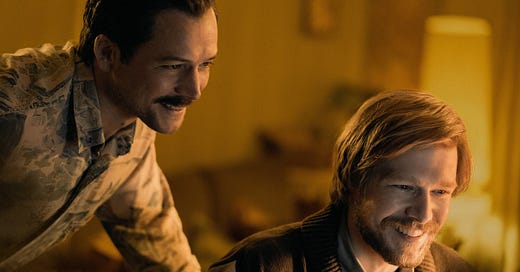Let’s just lay this out at the top: Tetris is a fun movie. Equal parts heist film, corporate espionage picture, and underdog story, all wrapped up in a tale of geopolitical intrigue centered on the most important moment of the second half of the twentieth century, Tetris zips along with verve and wit.
Noah Pink’s script opens with the sort of exposition dump that could easily get folks fidgeting on their couch (where most will see this movie, which debuts on AppleTV+ this weekend). Cutting between a bank in Tokyo, the Consumer Electronics Show in Vegas, Nintendo’s home office in Japan, and the spread of Tetris in the Soviet Union, we learn more than we ever knew we wanted to about video game rights—like, for instance, the fact that rights are split between PCs, arcades, video game systems, and handheld video game systems separately.
But his efforts to set the stage are aided both by his clean, concise writing as well as director Jon S. Baird’s snappy direction and Taron Egerton’s joie de vivre. Egerton plays Henk Rogers, an entrepreneur who is trying to get consumers hooked on a digital version of the ancient Chinese game Go. No one is terribly interested in Go. But everyone who plays Tetris at the booth next to his falls in love with it. One problem: getting the rights is tricky, owned as they are by a Soviet bureaucracy and already purchased for distribution in every territory except Japan by Robert Stein (Toby Jones), who in turn has sold the rights to corrupt British billionaire Robert Maxwell (Roger Allam) and his petulant nepo-baby son, Kevin (Anthony Boyle).
What follows is all far more exciting than it has any right to be, given that we’re dealing with contracts about intellectual property. It helps that the movie largely takes place in 1988, as the Berlin Wall is coming down; Soviet apparatchiks listen to Henk’s discussions with Tetris creator Alexey Pajitnov (Nikita Efremov) in almost comically evil-looking offices, concrete Brutalism lit from beneath by red spotlights to give the whole KGB lair a hellish glow. As a critic and not a historian, I don’t care too much that the stylized car chase and Henk and Alexey’s desperate flight from Moscow toward the end of the film almost certainly never happened; indeed, I appreciated the little adrenaline jolt.
Again, the movie is fun and fine. But what makes it interesting is that it’s almost naked propaganda for globalized commerce and freedom of corporate movement. A celebration of the triumph of the neoliberal will, perhaps. Tetris is not exactly subtle about this; the hero states on several occasions that he is a Dutchman raised in New York City who now lives in Japan with his wife, Akemi (Ayane Nagabuchi), whom he met while the two of them were studying in Japan. At one point, Alexey literally says “Good ideas have no borders.”
The villains in the picture are the two corrupt ends of the communism and capitalism spectrum: KGB functionaries who use violence and threats to obtain cash for themselves at the expense of their country, and British businessmen whose corruption and bribery serve not as a warning about the excesses of capitalism but as a reminder that cheaters never prosper. The heroes are globetrotting entrepreneurs, brave Soviets who want more for their society, and a video game company that is too pure to engage in the skullduggery of corporate bribery.
Tetris is the first in a cycle of what might be called “Brand Movies” to hit screens over the next few months, preceding Air (the Amazon-distributed Ben Affleck feature about the creation of Air Jordans) and BlackBerry (the Glenn Howerton-starring picture about the rise and fall of the iPhone’s much-loved predecessor). I haven’t seen the latter two (and I’d guess BlackBerry is a bit more skeptical of corporate life than either Tetris or Air), but there is something … amusing about two of the world’s biggest tech companies (Apple and Amazon) acquiring movies about the rousing and triumphant origins of two of the world’s most beloved brands (Tetris and Air Jordans).





